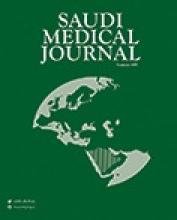Article Information
PubMed
Published By
Online ISSN
History
- Received March 4, 2015
- Accepted April 27, 2015
- Published online July 1, 2015.
Copyright & Usage
Copyright: © Saudi Medical Journal This is an open-access article distributed under the terms of the Creative Commons Attribution-Noncommercial-Share Alike 3.0 Unported, which permits unrestricted use, distribution, and reproduction in any medium, provided the original work is properly cited.
Author Information
- Hana R. Al-Bannay, MA, PhD⇑,
- Lyn E. Jongbloed, OT, PhD,
- Tal Jarus, OT, PhD,
- Sami S. Alabdulwahab, BSc, PhD,
- Tawfik A. Khoja, MD, GP and
- Elizabeth Dean, PT, PhD
- From the Program in Rehabilitation Sciences (Al-Bannay), the Department of Occupational Science and Occupational Therapy (Jongbloed, Jarus), the Department of Physical Therapy (Dean), University of British Columbia, Vancouver, Canada, and the Executive Board (Khoja), Health Ministers’ Council for Cooperation States, the Rehabilitation Sciences Department (Alabdulwahab), King Saud University, Riyadh, Kingdom of Saudi Arabia
- Address correspondence and reprints request to: Dr. Hana R. Al-Bannay, Program in Rehabilitation Sciences, University of British Columbia, Vancouver, Canada. E-mail: hana.albannay{at}gmail.com






